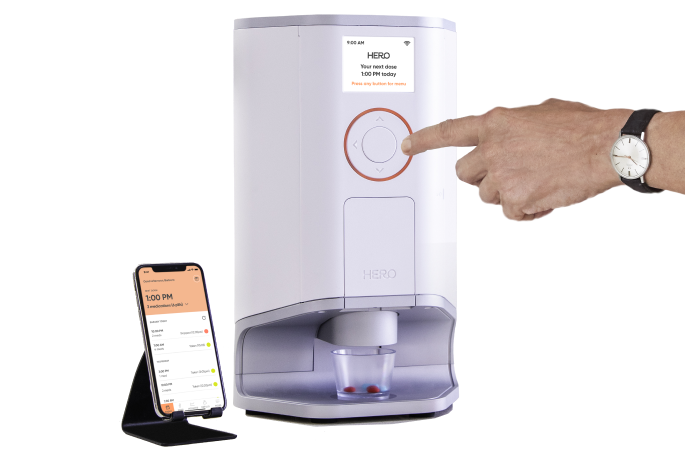Medication adherence: is it all in our minds?

In last month’s blog post, I discussed why patients may not take medications as prescribed, including economic causes, access, and personal habits. This month, we’re taking a look at some more psychological reasons why patients may fail to adhere to their medications.
The field of psychology has advanced many theories to explain human behavior, several of which have been applied to better understand the actions of patients. These theories include the role of social influence in learning behaviors, personal expectations about the outcomes of behaviors, and a person’s confidence in their ability to perform a behavior.
Let us examine how these theories can provide insights for the behavior of taking medications.
Social Learning Theory: how others influence adherence
Stanford University psychologist Albert Bandura is renowned for his contributions to understanding human behavior. His experiments in the 1960s demonstrated that children were more likely to imitate aggressive behaviors after observing the hostile actions of others. Such experiments led to Bandura’s Social Learning Theory, which posits that our behaviors are considerably influenced by our interactions with others. In later years, Bandura’s theory evolved to include the concept of self-efficacy, which involves the confidence a person has in their ability to perform a behavior.1
These concepts can be applied to better understand the behavior of medication adherence. Patients learn from their environment at multiple levels, such as from social interactions with other patients, visits with health care providers, and experiences with health care system.2 Additionally, the role of patient self-efficacy in taking medications has been applied to predict medication adherence for a range of chronic health conditions, including asthma, HIV, hypertension, and mental illness.3-6
Theory of Planned Behavior: how our intentions signal our actions
Another psychological theory that has been applied to medication use is the Theory of Planned Behavior. This theory suggests that a person’s intentions to perform a behavior are a significant predictor of that behavior. It also implies that a person’s intentions are influenced by the outcomes they expect, both positive and negative.
Many studies have applied the Theory of Planned Behavior to predict medication adherence.7-10 Research shows that patients may have little intention to stick to their regimen when they have inaccurate notions about a medication’s side effects, or if they are unconvinced about a medication’s potential benefits. In turn, the right education by a trusted source may greatly improve a patient’s intention to take their medication.
The Transtheoretical Model: how to meet patients where they’re at
The psychology of taking medication has also been examined according to different stages of behavior change. The Transtheoretical Model contends that such changes occur in stages, which progress from:11
- Precontemplation: having no intent to change the behavior
- Contemplation: intending to change the behavior within 6 months
- Preparation: devising a plan for action; behavior change is imminent
- Action: initiating the behavior change
- Maintenance: the behavior change persists and confidence grows
- Termination: finalizing the behavior change with complete self-efficacy; the person will not revert to prior behaviors
Numerous studies have applied the Transtheoretical Model to evaluate and improve medication adherence.12 This research suggests that efforts to promote medication use can be more effective when tailored to a patient’s current stage of behavior change. For example, a patient in the precontemplation stage may be unconcerned that they frequently skip doses, so they may benefit from education about their health condition and the advantages of a medication. However, this approach might be unnecessary for a patient in the maintenance phase of adherence, who may instead benefit from periodic reinforcement.
Psychological explanations for medication nonadherence: key points
While psychology can aid our understanding of why some people do not take medications as prescribed, these theories have generally been shown to predict medication adherence to a low or modest degree. This is not surprising, given the range of factors that can impede medication use.
Still, it’s important to acknowledge that the field of psychology has provided some key insights. While no single theory has proved to be superior, a few important themes have emerged:13
- Social Learning: Patients can be influenced by the actions of others, and also by their environment and experiences.
- Self-efficacy: Medication adherence can be improved when patients feel confident in their ability to take medications as instructed, especially when they feel capable of overcoming challenges that may arise.
- Beliefs about health conditions and medications can often translate into actions, and are influenced by a patient’s expectations about their medications’ risks and benefits.
Medication nonadherence is a complex problem that can be challenging to address. For some patients, medication nonadherence may be explained by economic or access barriers, or from simply misunderstanding the prescriber’s instructions. But when these more straightforward reasons are ruled out, addressing medication nonadherence may literally require new ways of thinking.
About the author
Stephen J. Kogut PhD MBA RPh is a pharmacist and professor at the University of Rhode Island College of Pharmacy, where he conducts research on medication adherence, prescription drug cost and patient health outcomes.
Sources
1. Bandura A. Self-efficacy: toward a unifying theory of behavioral change. Psychol Rev. 1977 Mar;84(2):191-215.
2. Berben L, Dobbels F, Engberg S, Hill MN, De Geest S. An ecological perspective on medication adherence. West J Nurs Res. 2012 Aug;34(5):635-53
3. Berg J, Dunbar-Jacob J, Sereika SM. An evaluation of a self-management program for adults with asthma. Clin Nurs Res. 1997 Aug;6(3):225-38.
4. Johnson MO, Neilands TB, Dilworth SE, et al. The role of self-efficacy in HIV treatment adherence: validation of the HIV Treatment Adherence Self-Efficacy Scale (HIV-ASES). J Behav Med. 2007 Oct;30(5):359-70.
5. Breaux-Shropshire TL, Brown KC, Pryor ER, Maples EH. Relationship of blood pressure self-monitoring, medication adherence, self-efficacy, stage of change, and blood pressure control among municipal workers with hypertension. Workplace Health Saf. 2012 Jul;60(7):303-11.
6. McCann TV, Clark E, Lu S. The self-efficacy model of medication adherence in chronic mental illness. J Clin Nurs. 2008 Nov;17(11c):329-40.
7. Şanlıtürk D, Ayaz-Alkaya S. The Effect of a Theory of Planned Behavior Education Program on Asthma Control and Medication Adherence: A Randomized Controlled Trial. J Allergy Clin Immunol Pract. 2021 Sep;9(9):3371-3379.
8. Lin CY, Updegraff JA, Pakpour AH. The relationship between the theory of planned behavior and medication adherence in patients with epilepsy. Epilepsy Behav. 2016 Aug;61:231-236.
9. Hugon A, Roustit M, Lehmann A, et al. Influence of intention to adhere, beliefs and satisfaction about medicines on adherence in solid organ transplant recipients. Transplantation. 2014 Jul 27;98(2):222-8.
10. Kopelowicz A, Zarate R, Wallace CJ, et al. Using the theory of planned behavior to improve treatment adherence in Mexican Americans with schizophrenia. J Consult Clin Psychol. 2015 Oct;83(5):985-93.
11. Prochaska JO, Velicer WF. The transtheoretical model of health behavior change. Am J Health Promot. 1997 Sep-Oct;12(1):38-48.
12. Imeri H, Toth J, Arnold A, Barnard M. Use of the transtheoretical model in medication adherence: A systematic review. Res Social Adm Pharm. 2022 May;18(5):2778-2785.
13. Holmes EA, Hughes DA, Morrison VL. Predicting adherence to medications using health psychology theories: a systematic review of 20 years of empirical research. Value Health. 2014 Dec;17(8):863-76.
Complex med schedule? We solved it.
Hero’s smart dispenser reminds you to take your meds and dispenses the right dose, at the right time.

The contents of the above article are for informational and educational purposes only. The article is not intended to be a substitute for professional medical advice, diagnosis, or treatment. Always seek the advice of your physician or other qualified clinician with any questions you may have regarding a medical condition or its treatment and do not disregard professional medical advice or delay seeking it because of information published by us. Hero is indicated for medication dispensing for general use and not for patients with any specific disease or condition. Any reference to specific conditions are for informational purposes only and are not indications for use of the device.



